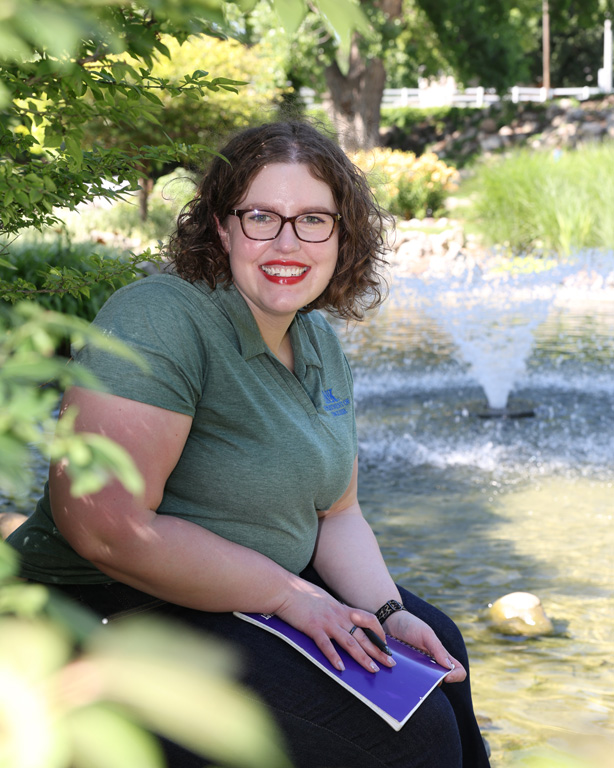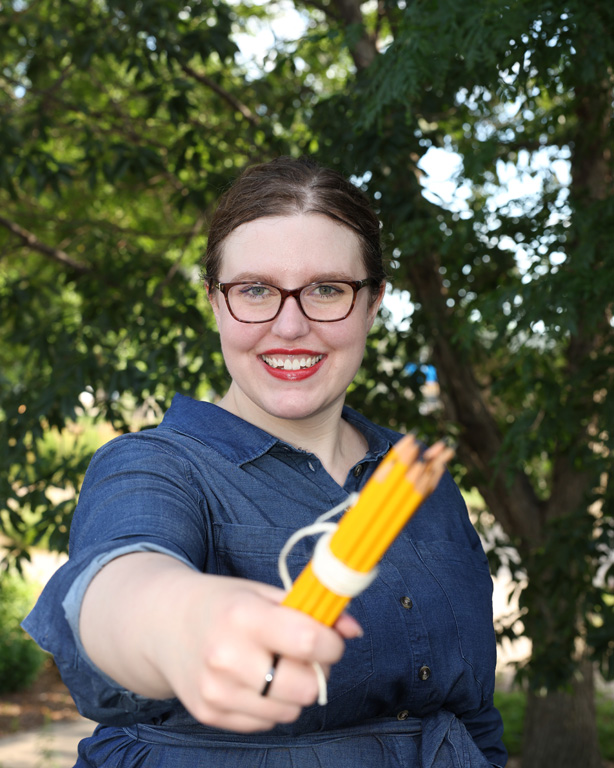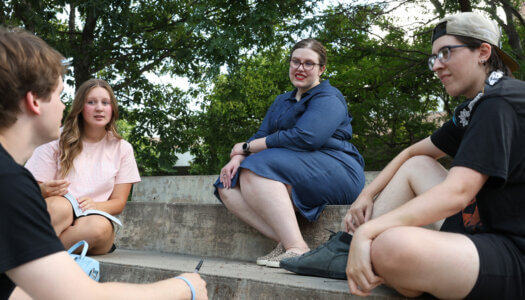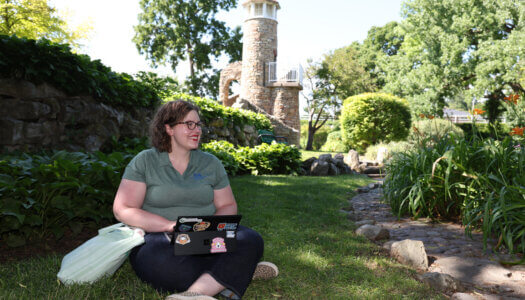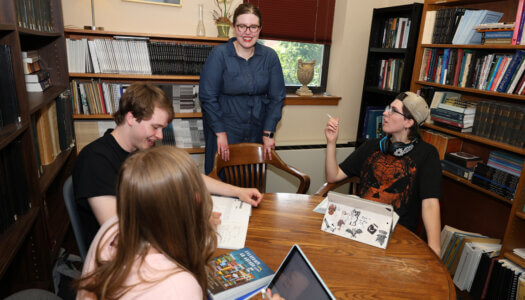
THIS STORY IS FEATURED IN THE 2024 NEW FRONTIERS MAGAZINE
By KIM HACHIYA
For UNK Communications
KEARNEY – Amanda Sladek benefited from excellent mentoring, advising and advocacy from faculty during her undergraduate and graduate experiences.
She knew she wanted to be like her role models, who were focused on student success and achievement. That’s why, she says, the teaching climate at the University of Nebraska at Kearney is a good fit for her and why she strives to be a role model for her students.
She’s successful in achieving that goal: Sladek received the Faculty Mentor Award from UNK’s College of Graduate Studies in 2022, and in 2023 she was a national finalist for Mortar Board Honorary’s Excellence in Advising award. The ideals of being a mentor, advocate and champion for students also drive her teaching and research.
Sladek, who joined UNK’s Department of English faculty in 2017 and is now an associate professor of English, teaches writing – specifically academic writing for first-year students. She also teaches upper-level and graduate courses on writing and language. While there is room for creativity in academic writing, she notes that academic writing classes differ from creative writing classes in their focus on school and disciplinary writing. Not only does this involve the nuts and bolts of writing (grammar, spelling, sentence structure), but it also involves thinking, reasoning, research, application of facts, thesis statement development, persuasive argument and other aspects.
The course, and the discipline, can be intimidating for students (heck, it can be intimidating for even the most seasoned senior faculty member) because many have not encountered the discipline before.
Sladek notes that students come from a variety of backgrounds and high school experiences. Some may have been required to write a senior “thesis.” Others may never have written more than short essays during their high school years. Students for whom English is a learned language, or who routinely speak in “non-standard” English, may particularly struggle.
The course prepares students to succeed in all their college courses regardless of major – students in business, biology, history, education, nursing, etc., need to be able to write competently because writing helps facilitate and distill thinking. And, of course, this type of writing often is encountered once students apply for jobs, and later in their careers. First-year writing is a foundational course for success, and all UNK students are required to take at least one semester.
Sladek notes that one of the foundational aspects of college is that students are given the freedom to think for themselves. Unlike in K-12 education, where students are rewarded for precisely following directions, college students have more leeway. And this also can terrify them, she said.
INCLUSIVE GRADING PRACTICES
Her course is “contract graded,” meaning she and each class collaboratively negotiate expectations that must be met to achieve a specific grade. If a student fulfills the expectations set by the class (related to attendance, assignment completion, etc.), they earn a baseline B. To earn an A, students must demonstrate extra investment in the class with a goal to improve their writing. All students receive Sladek’s feedback and comments on their work, though these comments are not associated with a letter grade on the assignment.
Sladek said research shows that traditional grading rubrics privilege students who have had the most traditional educational experiences and backgrounds. Students who are English language learners, speak in a “non-standard” dialect, or have different communication skills are at a disadvantage and can be stigmatized and receive lower grades. Using the contract grading rubric levels the field, she said, because every grade is achievable for every student. Moreover, students used to earning “easy As” still have to work. It takes the focus off the grade and more toward actual learning, she said.
Sladek is adamant about accepting language that isn’t necessarily “standard English.”
“Language is tied to identity,” she said. “By not accepting students’ language, we are making them feel unaccepted. So, I say they can write in AAE (African American English) or code-meshed English-Spanish. But we explain to each other why. It’s intellectually demanding to tell me why you’re making the language choices you are. No true language is ‘standard,’ which is the codified language of power. I do explain that there is risk involved in writing in your voice. You may find a professor or a job that doesn’t accept that. But that’s also in the realm of racism, classism, sexism.”
She and her students negotiate about how much they want her to comment on (not correct) their grammar, word choices and other aspects. They talk about why a student may want to make changes, particularly if their word choices are interfering with meaning or what they want to say.
This topic is part of her ongoing research into how to create a writing classroom environment that celebrates all languages and prior knowledge, not just those considered “academic.”

The contract grading technique supports Sladek’s efforts to help students understand their innate language capabilities. By mutually agreeing on how and what Sladek will comment upon in a student’s work, Sladek can support and encourage a student’s abilities.
The longstanding belief in the “supremacy” of “standardized English” is destructive for many students, Sladek said. Standardized English is filled with arbitrary rules that often seem needlessly petty and opaque. Enforcing those rigid standards is a way to dominate and devalue a person through policing their language use; it can become a way to purposely or unknowingly discriminate against a student.
Students for whom English is a learned language or who routinely use a form of English common in their cultures, or students from traditional American schools with less strong English programs, can feel marginalized and devalued when a paper comes back flooded with red ink. Yet each student comes to the university with innate and clear experience in language and communication. Sladek wants to build on that foundation.
Sladek is more interested in her students’ abilities to present clear, understandable content and meaning versus the proper placement of a semicolon or serial comma. She’s also far more interested in her students’ learning techniques of research, of ways of thinking, of how to present and defend arguments and beliefs.
In a paper published in 2022 in the Journal of Basic Writing titled “Student-Centered Grammar Feedback in the Basic Writing Classroom: Toward a Translingual Grammar Pedagogy,” Sladek outlined research she did in 2018 with a couple of her introductory classes.
She noted that most students do ask her to comment on (which she differentiates from correct or fix) their grammar. She notes it’s important for students to understand why language judgments occur and how to deal with them. Her students, she thinks, do eventually understand that grammar is less important than meaning and message. She wants them to think about their choices and why they want to conform to or challenge standardized English. This is an intellectually demanding process because it makes students think about their language goals regarding a variety of situations.
With about 60 students per semester, it’s a lot of reading on her part, but she knows it’s important for student success.

RESEARCHING PLACEMENT METHODS
Sladek is also directing a multiyear, grant-funded research project to assess how the way students are placed in first-year writing classes affects their learning. Students had been placed based on their ACT English scores – those scoring 17 or higher were placed in a 101 section; those below in 100A, which offers more individualized instruction. But this placement doesn’t fit all students, she believes, because there is a level of racial, cultural and linguistic bias in using test scores alone.
“Students misplaced by ACT alone may be pushed into 100A, which might not be needed. Or they may do better in 100A,” she said.
Sladek and graduate assistant Kiley Truex are studying a method called “Directed Self-Placement,” where students use an online tool that guides them to reflect on their prior experiences and helps them make choices about which class to take. The online survey asks about their previous academic experiences, how much outside reading they have done, their reactions to feedback, their writing habits, and whether they are comfortable asking for help before asking them to write a short paragraph. The answers then guide students to making a choice. They can also consult with the composition coordinator at any time, she notes, and are required to meet with their academic adviser before enrolling.
The data will track the effectiveness of Directed Self-Placement using “drop/fail/withdraw” rates, instructor feedback and student feedback. The hope, she notes, is increased student persistence to a degree and more student satisfaction with their own abilities and improvement.
“First-year writing is a bottleneck; it’s a predictor of college success,” she said.
Data is supporting the use of Directed Self-Placement at community colleges, but not much at the four-year college level, Sladek said. This study could support using the method at other campuses in the University of Nebraska System. The study has been funded by the Fred J. Kelly Fund through the University of Nebraska System.
PHOTOS BY ERIKA PRITCHARD, UNK COMMUNICATIONS

AMANDA SLADEK
Title: Associate Professor of English
College: Arts and Sciences
Education: Ph.D. in English, rhetoric and composition emphasis, University of Kansas, 2016; Bachelor of Arts in English and psychology, minor in history, Midland University, 2011.
Years at UNK: 7
Areas of Research/Specialization: Writing pedagogy, linguistic justice, writing program administration. Most of my research focuses on the teaching of writing. My biggest project right now is a grant-funded study on our Directed Self-Placement model of guiding students in selecting which first-year writing course they would like to begin with. This study combines data from student surveys; instructor interviews; assessment reports; and drop, fail and withdrawal rates to examine how DSP can influence students’ sense of agency in their learning, their feeling of belonging in the university, their success in first-year writing (a notorious bottleneck course) and college retention. My other research focuses on how to create a writing classroom that celebrates all of the languages and forms of knowledge that students possess, whether or not they’re considered traditionally “academic.”
Courses Taught: English for Academic Purposes; Introduction to Academic Writing; Academic Writing and Research; You at UNK: Developing Individual, Intellectual, and Interpersonal Identity; Introduction to Literature (Special Topics): Taylor Swift; Introduction to Linguistics; Advanced Writing; Teaching of Composition; English around the Globe; Theory of Rhetoric and Composition (Special Topics): Rural Literacies.
Recent Published Articles: “A Historical Perspective on Gendered Language in Writing Studies Journals,” Across the Disciplines, 2024. “Student-Centered Feedback in the Basic Writing Classroom: Toward a Translingual Grammar Pedagogy,” Journal of Basic Writing, 2022. “Say What You Want to Say!”: Teaching Literacy Autoethnography to Resist Linguistic Prejudice,” Self+Culture+Writing: Autoethnography for/as Writing Studies, 2021.
